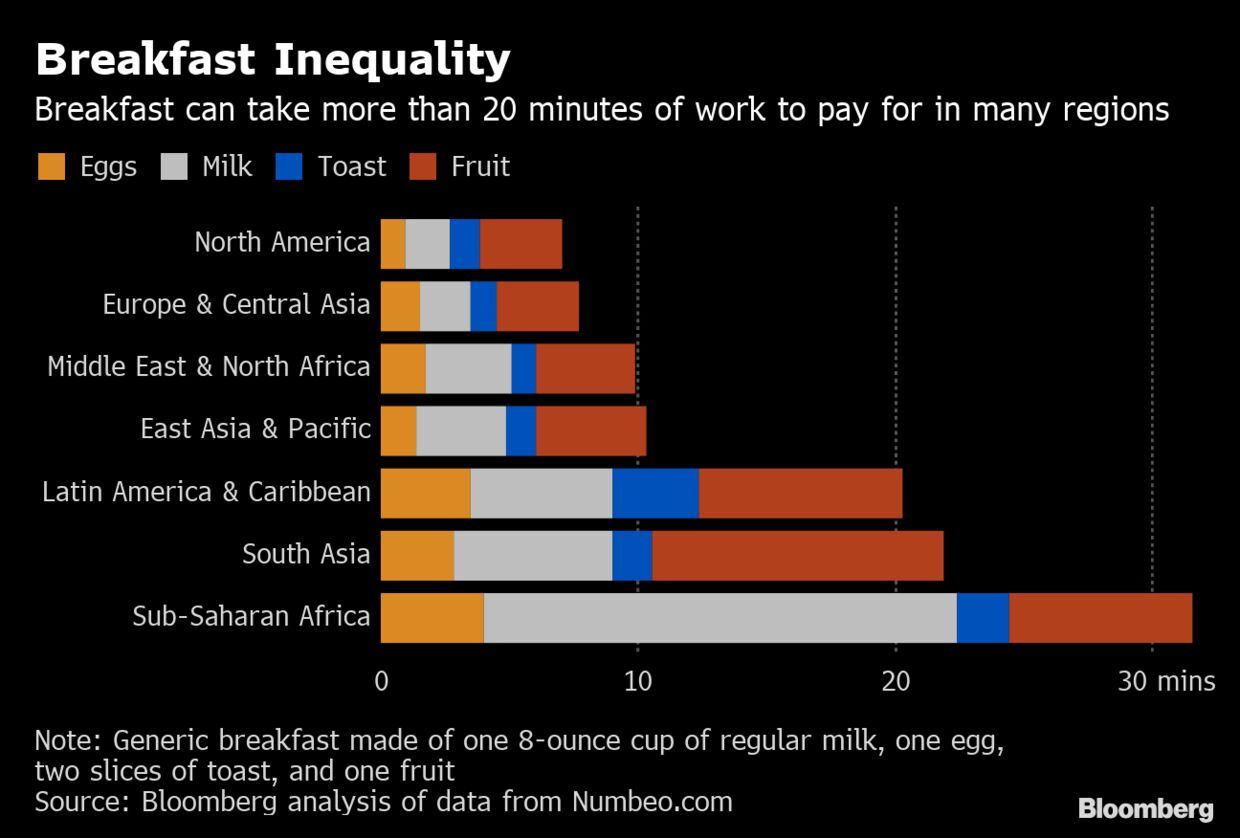By Shelly Hagan, Lee J Miller, and Wei Lu
Originally published in Bloomberg.
Whether scrambled, sunny-side up or as part of an omelet, eggs are a global breakfast staple. But not all eggs are equal when it comes to cost and affordability.
A morning meal has become increasingly easy to acquire for residents of tech hubs such as San Francisco and across Switzerland’s finance capitals, while people in Egypt, along with much of Sub-Saharan Africa have to work much longer to pay for their first meal of the day.
The latest edition of the Bloomberg Global City Breakfast Indexcalculated the relative daily costs and time needed to work to earn a glass of milk, one egg, two slices of bread and a serving of fruit. Rankings are based on self-reported market prices as of December 2018 from Numbeo.com, an online database of user-contributed city and country statistics in more than 100 locations.

In just four cities, a standard breakfast made up less than 1 percent of daily income: Geneva, Dubai, Luxembourg and Bern, Switzerland. This contrasts with residents of Accra and Lagos, who must shell out more than a quarter of their daily income for an identical meal.
Bloomberg picked the four food items based on widely available commodities that allow for price comparisons globally. What people across the world actually eat for their first meal of the day varies from egg-and-potato tacos in Mexico City to fried pork buns in Shanghai to cooked fava beans in Cairo.
Compared with the inaugural Breakfast Index in 2017, residents of Switzerland are better off now as incomes have increased at a greater pace than basic food prices. Of the top 20 most-affordable cities, five were in Switzerland and five were in Australia. It’s also important to note that typically as income rises, the proportion spent on food falls even if the absolute cost of food increases.
Among the major U.S. cities in the analysis, San Francisco, Boston and Houston provided the most affordable breakfasts, while Miami and Philadelphia ranked at the bottom. Hangzhou, where Jack Ma staked his Alibaba headquarters, emerged as the costliest among the five locales from mainland China. An average citizen there had to work 30 minutes to pay for breakfast.
To access full data set for the index, click HERE.

Breakfast cost the most at $4.45 in Hamilton, Bermuda. That’s up from $3.48 in the previous gauge. Just 2 percent of residents there were employed in agriculture and most food items are imported.
The 30 cities with the least affordable breakfasts were largely concentrated in South America, Eastern Europe, Southeast Asia and Africa. Many of these regions suffer from food insecurity, or limited access to affordable and nutritious food, which can lead to additional problems such as disease and even death.
In Accra and Lagos, the two cities with the least affordable food prices, the standard breakfast would take more than 2 hours of work to purchase. The index would show an even more staggering disparity if Caracas were included. However, due to hyperinflation and the complex currency situation, that nation’s capital was excluded from this year’s list.
“They don’t think in terms of breakfast, lunch and dinner,” said Johanna Mendelson Forman, a fellow at the Stimson Center in Washington. “They just think in terms of do I have enough money to buy a plate of food a day.”

Leave a Reply